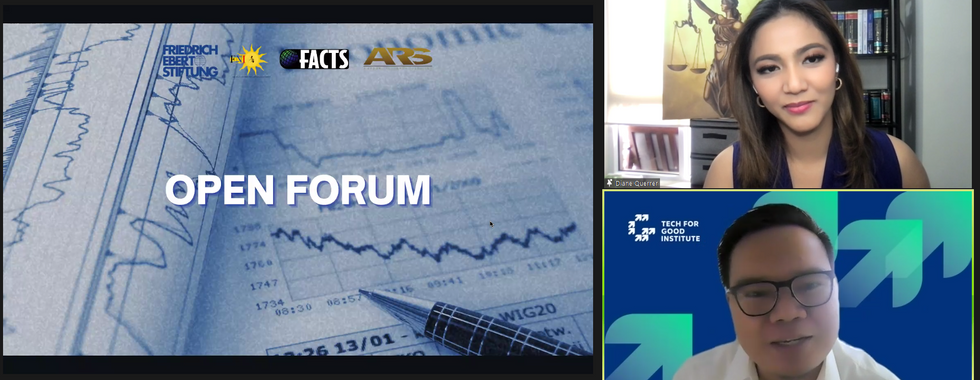Final EconSecurity Talks discussed the Policies, Trends and Challenges of the PH Digital Economy
- Foundation for the National Interest PH
- Dec 7, 2022
- 4 min read
PRESS RELEASE
05 December 2022
The Foundation for the National Interest (FNI) and Friedrich-Ebert-Stiftung (FES) Philippines, with the support of FACTS Asia and Amador Research Services convened the fourth and final installment of the 2022 EconSecurity Talks titled: Accelerating the Digital Economy in the Philippines: Policies, Trends, and Challenges on the 29th of November 2022 at 10:00 am PST via Zoom.
Resource speakers include: Department of Information and Communications Technology (DICT) Undersecretary Jocelle Batapa-Sigue, co-founder and Member of the Board of Directors of the National ICT Confederation of the Philippines (NICP); Ms. Jean Clarisse Carlos, Project Development Officer IV handling the Philippine APEC Study Center Network (PASCN) Network of East Asian Think-Tanks Philippines (NEAT), and East Asian Development Think-Tanks (EADN) Secretariats at the Philippine Institute for Development Studies (PIDS); and Mr. Keith Detros previously a digital economy specialist at the U.S. Department of State’s Embassy in Manila and current Programme Lead at the Tech for Good Institute. The webinar was moderated by PTV News Anchor, Ms. Diane Querrer with opening remarks from Mr. Mirco Gunther, Head of Asia-Pacific Department at Friedrich-Ebert-Stiftung (FES) Philippines and closing remarks from VADM Jose Luis Alano (Ret.), FNI Chairman of the Board.
The high potential of the digital economy sector is given great emphasis in the current Philippine administration's national development plan, as it is recognized for its significant contribution to economic growth and employment opportunities, most especially during the COVID-19 pandemic. Relative to the digital economy’s positive contributions, the webinar also explored issues within the sector including human rights violations, security issues, misinformation and disinformation, exploitation and misuse of personal data, and cybercrimes, among others. These discussions aim to explore not only how the Philippines can utilize different strategies to advance the sector, but also address its negative impacts to human rights and security with the right policies and future recommendations.
During the opening remarks, Mr. Mirco Gunther mentioned how we are currently in the Fourth Industrial Revolution or the new age of digital economy. He states that as the digital economy sector will continue to play a role in our post-pandemic lockdown world, social and security dimensions must be considered including the positive and negative impacts of the sector, how to ensure digital economy access for women and marginalized groups, challenges of cybersecurity, data privacy, supply-chain issues, as well as sustainability and environment protection issues.
Usec. Jocelle Batapa-Sigue divided her presentation into five sections: 1) Commitments and Plans for a Digital Economy, 2) Leveraging Cooperation, Involvement and Partnerships, 3) Policies and Regulations for a Digital Economy, 4) Cybersecurity Issues, Risks, and Challenges, and 5) Three Pillars of Action. The government’s current policies and future plans for the sector were also mentioned, most especially emphasizing the importance of “digital jobs, digital investments, for every Filipino regardless of where they reside.” Usec. Batapa-Sigue concluded her presentation with actions to be taken such as enhancing Digital Skills Training and Education, and promoting digital trade opportunities.
Ms. Jean Clarisse T. Carlos focused her discussion on Women-led Micro-, Small-, and Medium Enterprises (WMSMEs) in the Philippine Digital Economy, which included policies, trends, and challenges relative to WMSMEs. She states how MSMEs in the Philippines are seen as socio-economic drivers, therefore playing a major role in sustaining the country’s economic growth. Ms. Carlos also states that women own 50% of microenterprises and 59% of SMEs in East Asia and the Pacific as of 2018, however they encounter challenges such as lack of public policies or programs explicitly promoted for women in general, and women in the digital economy more specifically. She added that women encounter multiple barriers in the digital economy such as unequal laws, inability to meet collateral requirements due to lack of property ownership, harassment at public offices, and lack of business knowledge and financial literacy. In her co-authored study titled “E-Commerce Adoption and its Impact on the Performance of Women-led MSMEs in Metro Manila: An Ex-Ante Study for RCEP (2022)”, the benefits, most cited issues, and cybersecurity in e-commerce were discussed as well.
Mr. Keith Detros discussed the existing potential of the Philippines in terms of the digital economy. This potential however, can be transformed into a reality if we address the problems we currently have. As exhibited in the Network Readiness Index 2022 and Global Digital Competitiveness Index 2022, the Philippines is trailing behind other Southeast Asian states. Mr. Detros emphasizes the need for the country to build a confident digital society since giving access to digital technologies is not enough, it is also vital that these technologies thrive to meaningfully impact consumer’s lives. In order to do this, the country must develop: (1) Digital literacy; (2) Financial literacy; and (3) Cybersecurity. He further adds that “the [country’s] digital economy can only grow if we foster confidence and trust in the ecosystem among the digital consumers.” Aside from building confidence in the digital society and improving adaptation measures, the Philippines needs to adopt a whole of government approach and a whole of society approach to enable the growth of the digital economy.
The questions raised during the open forum include: (1) the key policies for data ecosystem and digital infrastructure, (2) digital and financial literacy in the education curriculum, and (3) predicting the growth rate of the digital economy in the Philippines.
VADM Jose Luis Alano (Ret.) closed the forum by providing a brief recap on the previous EconSecurity Talks webinar. He states that these webinar series have underscored the various factors and considerations needed to improve the country’s economic security. On one hand, the Philippines needs to deal with different and conflicting laws, regional cooperation, and geopolitical aspects. On the other hand, the country should take into account the integration of technology, conservation of the environment, and the dignity of our fellow citizens. He formally closed the EconSecurity Talks series by echoing former Secretary General Ban Kim-Moon’s remarks “Sustainable development is the pathway to the future we want for all. It offers a framework to generate economic growth, achieve social justice, exercise environmental stewardship and strengthen governance.”
Around seventy (70) people attended this webinar event. Participants came from various sectors nationwide consisting of students, professors, government officials, defense and security personnel, the diplomatic corps, and non-governmental organizations.
A total of three hundred sixty-nine (369) participants attended the entire 2022 EconSecurity Talks Webinar Series.
Screenshots of event below.



















Comments